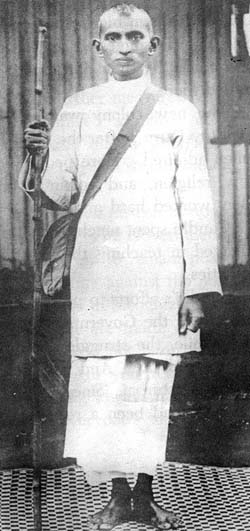
Some men changed their times...
One man changed the World for all times!
Comprehensive Website on the life and works of
Mahatma Gandhi
+91-23872061
+91-9022483828
info@mkgandhi.org

+91-23872061
+91-9022483828
info@mkgandhi.org
10. Assault |
In August 1906 an ordinance was issued by the Transvaal Government requiring all Indians-men, women, and all children to register themselves and obtain a personal certificate bearing name and thumb impression. This card was to be carried by all individuals at all times and must be shown on demand. Anyone failing to produce the certificate was liable to be fined, imprisoned, or deported. The police even had orders to enter private houses and check certificates. 'This is too much to bear,' Gandhi told his co-workers, 'If we meekly submit, it will spell absolute ruin for us in South Africa. We must take action immediately if we are to live here.' The Indians decided not to submit to this humiliating and insulting measure. They must fight it. But how? Gandhi saw here the need for passive resistance or Satyagraha. First, he said, they must be prepared to observe absolute non-violence. The authorities would take all measures to put down the agitation. They might use violence, arrest people, and send them to jail, but all must faced without resistance. 'Merely disobeying the Government's laws will not be enough.' Gandhi said, 'You must have no hatred in your hearts. And you must cast away all fear.' The Government ignored all Indian protests against the ordinance and it came into force. The Indian decided to disobey the provisions of the 'Black Act'. Hundreds of Indians were arrested, tried, and imprisoned. They all pleaded guilty and went to jail without putting up any defence. Gandhi too was imprisoned. Then one day he was taken out of prison and sent to Pretoria to see General Smuts. 'This movement you have started,' Smuts said, 'must obey the law.' 'I would rather die than submit to the law,' Gandhi replied. 'It is meant to humiliate the Indians.' After some argument, however, they reached a compromise. Gandhi promised to end the Satyagraha if the 'Black Act' was repealed and the prisoners released. Smuts agreed to do this provided the Indian would register of their own accord. On this agreement, they parted. Back in Johannesburg, Gandhi called a meeting of the Indians. 'We must now register voluntarily to show that we do not intend to bring a single Indian to the Transvaal by fraud,' he said. 'If we show our goodwill by prompt registration, General Smuts will see that the "Black Act" is repealed.' Most of the Indians agreed with Gandhi, but a Pathan named Mir Air Alam shouted at him: It was you who told us that finger-prints were required only from criminals. It was you who said must disobey the "Black Act". How does all that fit into your attitude today? Early the next morning Gandhi, with his fellow Satyagrahis, set out for the registration office. But on the way Mir Alam attacked him with a heavy stick. Gandhi fell down unconscious. Mir Alam and his associates went on beating him until he was rescued by some friends. When Gandhi recovered consciousness, he found himself on a coach in the house of an Englishman whom he hardly knew.  As a Satyagrahi in South Africa Struggling to sit up, Gandhi said in a weak voice, 'Do not blame Mir Alam, for he did not understand.' Then he insisted that a clerk from the registration office should come to take his thumb impression and make out his certificate, in this way Gandhi was duly registered. Many Indians followed Gandhi by registering voluntarily. But General Smuts did not repeal the 'Black Act'. The Indians disappointed at the Government's attitude, demanded a return of their applications for the voluntary registration. Still the Transvaal Government did not budge. Gandhi, who had by then recovered from his injuries, gave an ultimatum: 'If the "Black Act" is not repealed before a fixed date, the certificated collected by the Indians will be burnt.' When he found that the Government ignored this threat, Gandhi started another Satyagraha movement. A big bonfire was lit and more than two thousand certificates were burnt. Many Indians openly crossed the border into the Transvaal, where their presence was illegal. Gandhi and many of his compatriots were imprisoned several times in the course of the agitation. When Gandhi came out of jail for the third time, the Indians held a meeting and decided to send a deputation to England to acquaint the British Government with the real situation in South Africa. Gandhi and Seth Haji Habib were asked to go to London and present the grievances of the Indians. Accordingly they went, but the mission was a failure. They returned with grim determination to fight to the bitter end. Gandhi then made a big decision. He gave up hid practice as a lawyer. He felt he could not go on earning his living by law when he was defying it. |